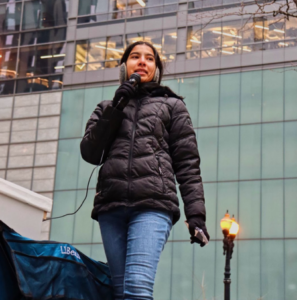Natasha is a senior at Hinsdale Central High School. She is co-head of Fridays for Future Chicago, which she leads with fellow IOF student, Danica Sun. They met in the IOF program.
Tell a story about an experience that made you aware of climate change/inspired you to be a part of climate activism.
Pebbles crackle beneath my feet as I walk through the forest, sunlight filtering through the leaves of towering trees above. A gentle breeze brushes my arm and makes the plants along the path dance. Utterly alone with the sounds of the forest, I take a deep breath, feeling completely content. I’ve always loved nature, and I’m forever fascinated by its beauty. But in 10th grade, after watching Before the Flood, a climate change documentary focusing on ocean acidification, I realized the potential for mass environmental devastation if we do not take action. 
What was a time you had to be resilient in climate change work?
Worried for our planet, I knew I needed to raise my voice, so I joined the Save Bell Bowl Prairie Movement, where the Rockford Airport’s expansion threatened the 8,000-year-old Prairie. I circulated a petition with over 100,000 supporters, advocated at festivals, and delivered a speech to the board emphasizing that our environment cannot be sacrificed for profit.
But it wasn’t enough. The prairie was destroyed.
The devastation was heartbreaking, and I felt a profound sense of loss. I’d poured myself into fighting against this project, and it made the failure hurt that much more. This made me question if I should continue and prompted me to reflect on my activism. I realized that I cannot solve climate change alone, and I needed to be the wake up call for more people to end their avoidance and denial. But how?
My dad once told me that “our past holds the clues to our future.” So, in thinking back on my childhood, I remembered how he’d weave imaginative tales of characters from my Nancy Drew books traveling through the Stargate to alien fantasylands. I vividly identified with Nancy, admiring her courage and ability to bridge divides between different worlds.
Connecting with these memories, I realized that my speeches focused on my priority, environmental protection, but the board cared about profit and didn’t see their perspective reflected. I understood then that the stories that stick are the ones in which the audience sees themselves, just like how I identified with Nancy. So, going forward, I decided to combine the public speaking skills I developed through Debate, Speech and Mock Trial with effective storytelling to bring about societal change as an environmental activist.
What does a better world look like to you?
A better world is one where the health of our planet and the people is prioritized, one where the people’s voices are not drowned out by corporate greed and influence. A better world is one where we are not constantly hearing about an environmental disaster or a shooting or a police brutality case or a discriminatory law or the innocent lives lost that builds to a rage at the injustices in the world, and each time people take to social media to post and their part is done, and the issue to fades away to be replaced by something new, the cycle repeats, and gradually we grow tired and indifferent to anything outside of ourselves. To build a better world then, we must all take action in our daily lives and refuse to accept that we cannot make a difference. We must make such issues of climate and human rights a priority in our homes, schools, and businesses. By focusing on education and awareness, we enable youth to start the process of building a better world today.
How does going to COP play a role in your climate activism journey?
At COP28, I want to learn more about how climate policy is enacted on a global level, and how youth can be more powerful in creating change. I hope to share these lessons in my future climate initiatives through telling stories of COP to inspire youth and help them take action more effectively. COP will help me gain a global perspective on the climate crisis, and will also show me how I can be most effective in promoting environmental protection in my future career, whether that be through developing sustainable technology, environmental law, green investment strategy, or something else, COP will enable me to continue to make a difference throughout my life.
What do you want world leaders to know?
I want world leaders to know that they will be held accountable for their actions, as we are not satisfied with their fake promises of environmental protection as their priority only to approve new fossil fuel projects. Though each nation has it’s own considerations, we must work together to protect our planet for the future generations.
